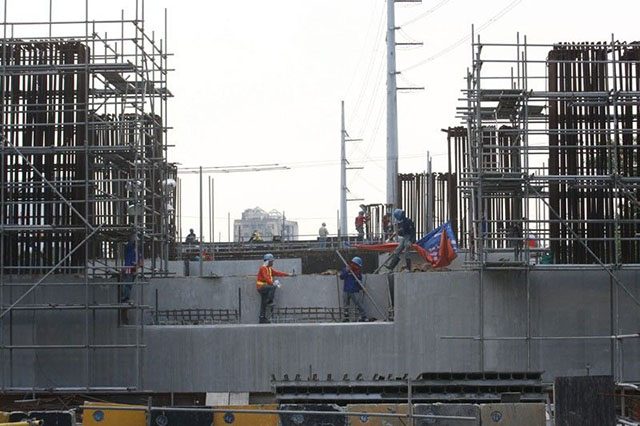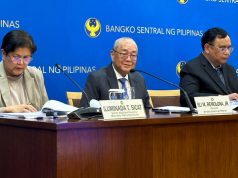
MANILA — The Philippines expects economic growth to recover to 7-8 percent target next year despite global uncertainties, as it pushes ahead with massive infrastructure spending plans, the country’s budget secretary said on Wednesday.
Benjamin Diokno said the gross domestic product (GDP) growth would be back to targeted level next year, mainly bolstered by President Rodrigo Duterte’s $180-billion infrastructure building campaign.
“We are confident that we would be back on track next year,” Diokno told Reuters. “We are very positive that our ‘Build, Build, Build’ program will sustain growth of around 7 percent for the next 10 years.”
In the second quarter, annual growth slowed to a near three-year low of 6.0 percent, leaving it set to undershoot the government’s target of 7-8 percent for this year.
The International Monetary Fund (IMF) and the Asian Development Bank (ADB) have trimmed their 2018 growth forecasts for the Philippines. The IMF expects 6.5 percent expansion while the ADB foresees 6.4 percent.
The weak peso has also helped lift inflation, which in September reached a near-decade high of 6.7 percent.
Diokno said the current high inflation was “transitory” and was mainly driven by high oil prices. Citing the IMF and ADB forecasts, he said the inflation would reach the targeted level of 2-4 percent next year.
Speaking to Reuters in a separate interview, Diwa Guinigundo, deputy governor of Bangko Sentral Ng Pilipinas (BSP), the country’s central bank, said the peso’s fall to near 13-year lows against the U.S. dollar was due to global factors including U.S. interest rate hikes and the U.S.-China tariff war.

“I think our currency has some fundamental bases to remain stable and strong,” he said.
The deputy governor also said that monetary policy had a “very strong tightening bias” aimed at bringing inflation down to a 2-4 percent target range.
To contain inflationary pressures and support the struggling peso, the BSP has raised interest rates a total of 150 basis points since May.
China investments
Diokno said the tariff war between the world’s two largest economies was likely to result in Chinese companies investing more in Southeast Asian countries.
“They (Chinese companies) might look at Indonesia, Thailand and the Philippines. That also favors us,” he said.
The budget secretary, however, said his government would be “very strict” in awarding large infrastructure projects to foreign contractors, including those from China, to ensure the financial viability of those projects.
“We are very careful in choosing our projects (for foreign builders),” he said. “We have decided to assign projects – this project will go to Japan, this one to China.”
Some Philippine senators have expressed concern over infrastructure projects funded by Chinese debt after neighboring Malaysia questioned the value of such deals and the risk that they would leave Malaysia “indebted”.
Diokno also said that the government was “comfortable” with its budget deficit target of 3 percent of the GDP in the near-term, as it continued to invest more at home to cushion the impact of sluggish exports.
To limit overheating risks and avoid overburdening monetary policy, the IMF last month urged the government to adjust its budget deficit targets to make it “neutral” rather than expansionary.
A neutral fiscal stance would imply a lower budget deficit equal to 2.4 percent of gross domestic product this year and 2.5 percent next year, compared with the government’s 3 percent and 3.2 percent targets for 2018 and 2019, the IMF said.
Diokno said his government had told the IMF it was unwilling to lower the deficit target as it would result in “a lot of half-finished projects.” — Reporting by Sumeet Chatterjee and Fransiska Nangoy; Editing by Simon Cameron-Moore









